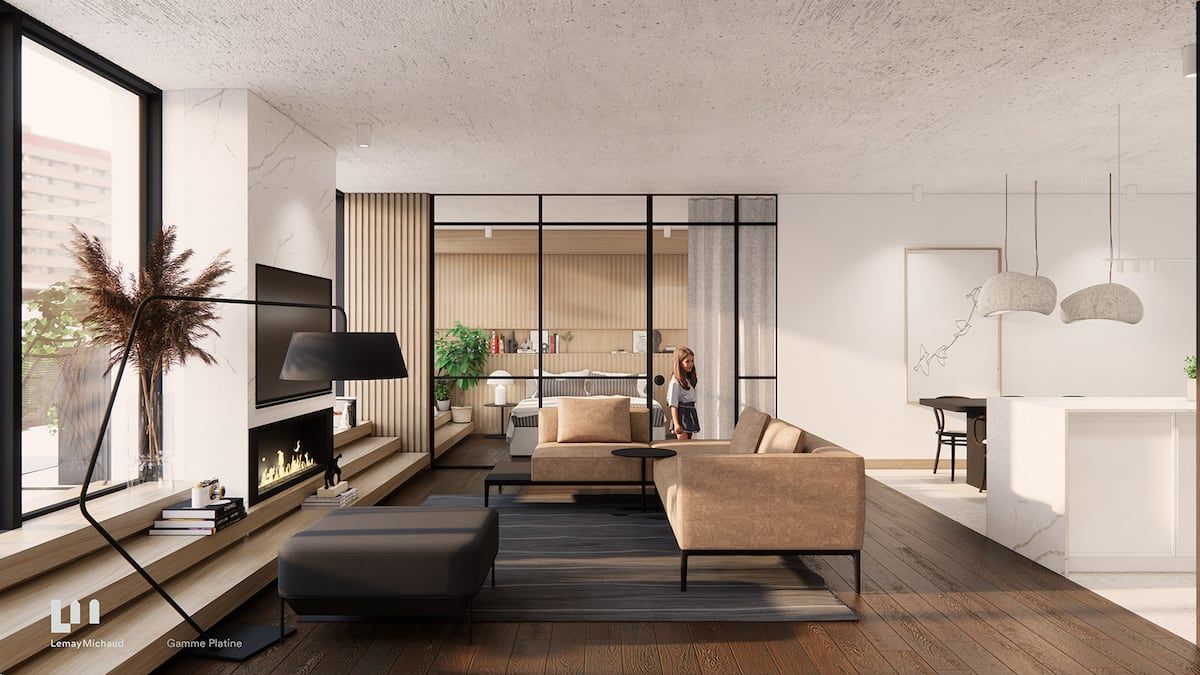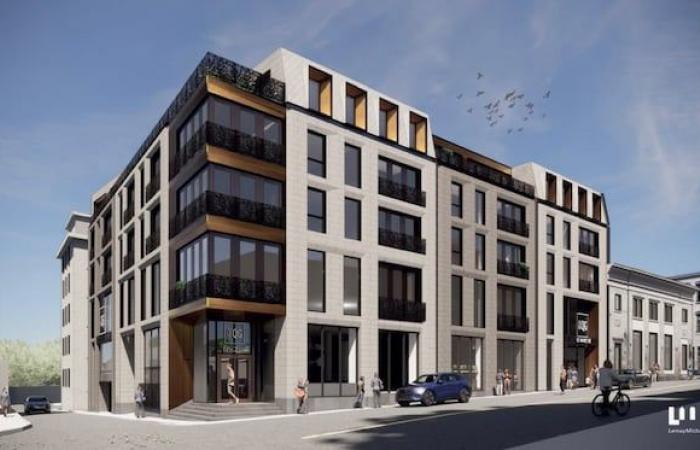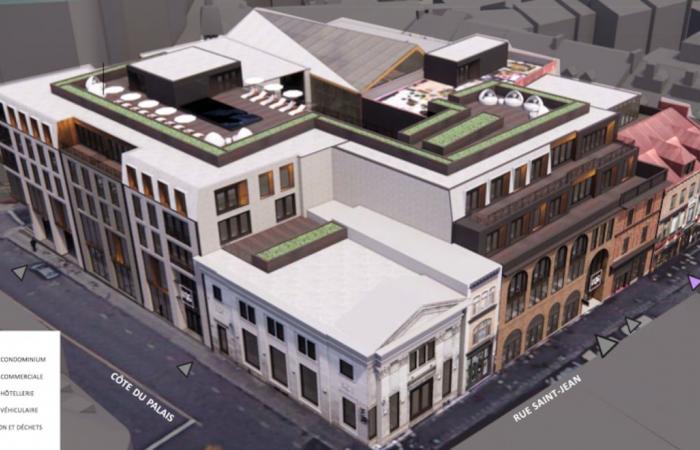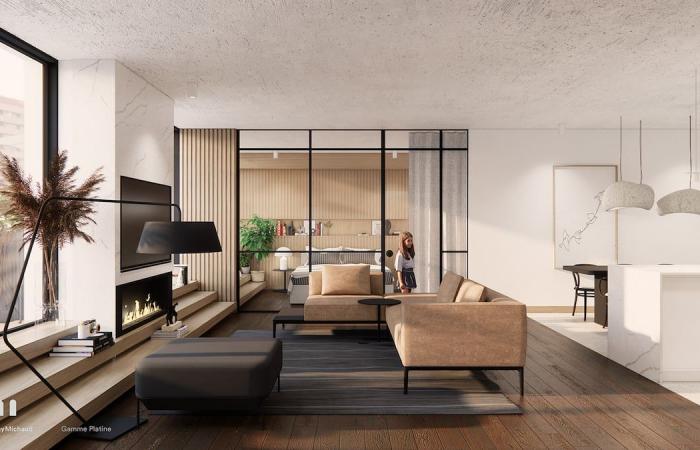“We’re starting to dig. We will have the crane on the ground. We have already put up fences, the street is moved and we are starting the excavation,” breathes in an interview with Soleil Capwood President and CEO Denis Epoh.
The developer has been waiting for this moment for almost seven years. Having become the owner of the vacant land wedged between Charlevoix, Hôtel-Dieu, Saint-Jean and Côte du Palais streets after a call for proposals from the City of Quebec in 2018, Capwood has long dreamed of a “middle of life” in the heart of Old Quebec.
The five-story building that will take the place of the vacant lot is now valued at $70 million.
But with 29 residential units for sale in condos on five floors rather than the 40 that the developer planned to build in 2021, Capwood was forced to lower its ambitions. And to postpone them until later.
“It’s not the same project, but we’re not very far from what we wanted to do. It’s smaller and there is a lot less commercial, with only a market floor and services,” compares Mr. Epoh, who nevertheless emphasizes having “worked hard” to maintain the grocery component. “We didn’t want to compromise on that, because it’s a service that’s lacking.”
On October 19, 2021, the real estate company presented with great fanfare the models of the construction which would fill the empty lot in the heart of the historic district. A specialized market for local producers and artisans, an integrated food hall, a fitness center, a medical clinic, a hair salon, a restaurant offering, the Old Quebec HQ was to become a “spark plug” for the entire neighborhood.
However, three years later, little has changed and the gaping hole still attracts the eye of passers-by. From delay to delay and due to constraints of all kinds, the start of construction, originally planned for spring 2022, begins this Tuesday.
The vacant land on Îlot Charlevoix (Patrice Laroche/Archives Le Soleil)
Described as the “wart” of Old Quebec by the leader of the municipal opposition just last week, the land will change its face in a few years. The complex will welcome its first residents in the summer of 2027. Already, around 40% of the condos have been sold, underlines Denis Epoh.
“Complex” culture
Enough to give him reason to have continued the adventure, he maintains, visibly relieved. “It’s definitely an obstacle course,” says the manager.
The pandemic initially delayed the schedule by a year.
But it is more the Ministry of Culture which has played spoilsport in recent years. Concerned about “preserving history,” provincial authorities said no to development that was to extend to adjacent buildings in the area, such as the Bank of Montreal, the Hôtel du Vieux-Québec and the Collin Pavilion, a surplus building. of the Hôtel-Dieu de Québec.
“They are doing their job, but it affects the number of new projects that we can deliver in Old Quebec.”
— Denis Epoh, Chairman and CEO of Capwood
“We wanted to take advantage of the opportunity to add other neighboring buildings around to create an impact project. This is what did not work with the ministry,” summarizes the president and CEO of Capwood.
Originally, the developer thought of revamping the entire Îlot Charlevoix quadrangle with his QG Vieux-Québec project. (HQ Old Quebec)
Between the choices of construction materials, the height of the building, the repair or replacement of existing facades, obtaining the seal of the Ministry of Culture will not have been easy. We could not do the project until he was satisfied,” explains Mr. Epoh, who finally received the necessary authorization last April.
For clearer “rules of the game”
“In Old Quebec you have to expect that it will take time,” admits the manager of Capwood.
Never, he adds, would he have expected so much time to make his “dream” a reality. The developer is against sometimes vague “rules of the game”.
“It took seven years before we got a permit and sanction from the Ministry of Culture. It’s not because we didn’t want to start construction earlier, but they make sure that the rules are respected and sometimes, when we don’t know them, we have to change and it drags on,” laments Denis Epoh.

HQ Vieux-Québec will offer 29 luxury condo units. (LemayMichaud)
While the Marchand administration is “doing its part” and hopes to replenish Old Quebec with services and reverse the trend of desertion of permanent residents, the authorities would benefit, he believes, from sitting down and presenting a “plan” established “what is permitted and what is not.”
“There, there is no framework, there is nothing. You have to negotiate everything piecemeal and we don’t know where we’re going. We need to be aware of what it takes.”
Raising projects in Old Quebec is so complex that only two have seen the light of day in recent years, he illustrates, citing the Monsieur Jean hotel and the Circa condo building.
Not to mention that the investment to see them emerge from the ground is also more expensive than elsewhere, adds Mr. Epoh.
No groundbreaking has yet been done on Îlot Charlevoix and the developer calculates that he has had to spend some $14 million so far. The permit and street rights-of-way alone cost a million.
“We get caught up in the game: we advance, we spend. That’s a lot of risk we’re taking. If we knew we couldn’t do certain things when we left, we would limit ourselves to what we can do. But we don’t know, we’re navigating into nothingness and it costs what it costs.”
Throughout the entire process, with a project cut from several condos, “profitability takes a hit.” The same project built elsewhere would have been more profitable, according to Mr. Epoh.
“It doesn’t allow us to make money, but it allows us to deliver the project without losing too much money. The only thing on me now is not to lose money.”
— Denis Epoh, Chairman and CEO of Capwood
Capwood makes no secret of it: the Old Quebec HQ will offer prestigious units. “As a matter of fact, Old Quebec costs more than elsewhere. There are very few new units, so we must expect them to sell for more,” advises its director.
But it still promises buyers “reasonable prices”. “I can’t charge $1,000 per square foot either. We’re not in Toronto. We must take into account the ability to pay,” agrees the promoter, leaving the mystery surrounding its prices.








